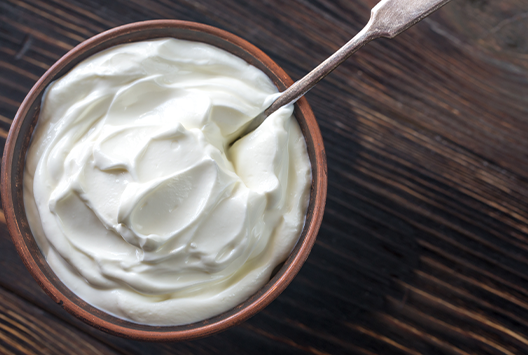
10 Surprising Effects of Eating Sour Cream
Similar
Eating sour cream may not be the first thing that comes to mind when you think of healthy foods, but it has some surprising benefits.
Sour cream is a dairy product made from cream that has been fermented with lactic acid-producing bacteria. It is a popular condiment in many dishes, especially in Mexican and Central American cuisine. Not only is it a tasty addition to your meals, but it also has a range of positive effects on your health. Here are 10 of them:
1. Improved Digestion: Sour cream contains probiotics, which are beneficial bacteria that help maintain a healthy digestive system. Probiotics help break down food more efficiently and reduce bloating and stomach discomfort. They also help balance the bacteria in your gut and promote good digestion as well as reduce symptoms of irritable bowel syndrome (IBS).
2. Enhanced Immunity: Sour cream contains lactic acid bacteria, which can help boost your immune system. These bacteria help fight off infection and disease, keeping you healthy and strong.
3. Better Nutrient Absorption: Sour cream is rich in fat-soluble vitamins such as A, D, E, and K. These vitamins are essential for good health, and they can be more easily absorbed by the body when consumed with fatty foods such as sour cream.
4. Reduced Risk of Heart Disease: Sour cream is low in cholesterol and saturated fat, and high in monounsaturated fat, which can help reduce your risk of heart disease. Additionally, it contains conjugated linoleic acid (CLA), which has been shown to reduce the risk of stroke and other cardiovascular diseases.
5. Improved Bone Health: Sour cream is a good source of calcium and vitamin D, both of which are essential for strong and healthy bones. Additionally, it contains phosphorus which helps maintain the structure and strength of bones.
6. Improved Weight: Sour cream can help keep you feeling fuller for longer, which is great if you’re looking to maintain a healthy weight. Additionally, it is low in calories and contains conjugated linoleic acid (CLA), which has been shown to help reduce body fat and increase lean muscle mass.
7. Better Skin: Sour cream is rich in lactic acid, which helps promote healthy skin by exfoliating dead skin cells and promoting cell renewal. Additionally, it can help reduce wrinkles and fine lines, keeping your skin looking youthful and vibrant.
8. Improved Brain Health: Eating sour cream can help keep your brain healthy. It is a good source of Omega-3 fatty acids, which have been shown to improve cognitive function and reduce the risk of Alzheimer’s disease.
9. Improved Vision: Sour cream is also rich in vitamin A, which helps protect your eyes from age-related vision problems.
10. Improved Blood Sugar Control: Sour cream is a good source of protein, which can help regulate blood sugar levels. This can be beneficial for people with diabetes.
Sour cream is certainly a tasty and healthy addition to your meals
It's clear that sour cream is both a delicious and nutritious addition to your diet. Whether you're looking for a creamy topping for tacos or a tangy twist to your favorite pasta dish, sour cream is an ideal option. Not only is it packed with vitamins and minerals, but it can also help promote healthy gut bacteria, reduce inflammation, and even improve your skin. So go ahead and enjoy all the zesty, creamy goodness that sour cream has to offer. Your taste buds and your health will thank you!
Are you looking for premium dairy products? Then Baladna is your best option! We provide our customers with a wide selection of delicious, high-quality dairy products that are perfect for any meal. From creamy sour cream and Greek yogurt to feta and halloumi cheeses, we provide our customers with the freshest and most nutritious dairy products available. All of our products are sourced from local farms, ensuring that they are of the highest quality. Check out our list of dairy products today!



